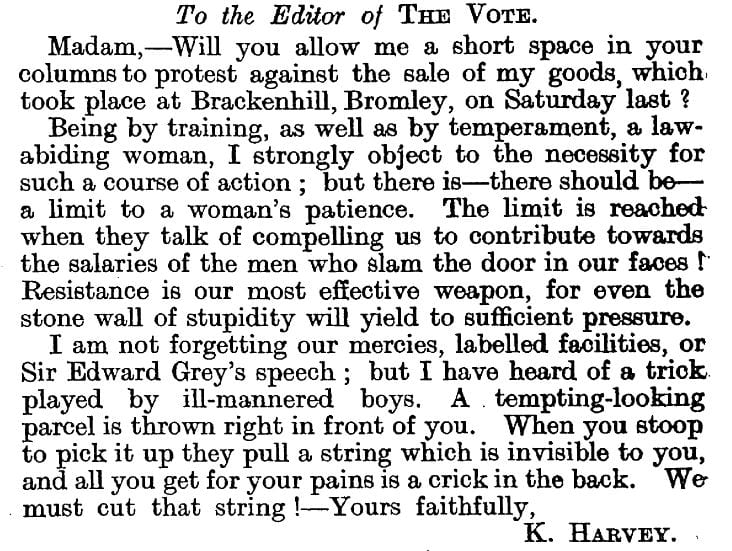A Deaf suffragist – Kate Harvey 1862-1946
By H Dominic W Stiles, on 16 March 2018
Born Felicia Catherine Glanvill, but also known as ‘Glanville’ and as ‘Kate,’ little is known about the youth of this deaf suffragist. Her father’s familiy was from East Surrey, her grandfather being a ‘philosophical instrument maker.’ She was born in Peckham in 1862, and named after her mother, Felicia Catherine La Thangue, whose father was a mariner. Her mother died when she was young, in 1870, and her father Frederick then died when she was about sixteen, in 1879. Grandmother Felicia, her mother’s mother, was described as a Professor of Music on the 1871 census, and I wonder if she took over care of her three grand daughters. At any rate I was unable to find the three sisters on the 1881 census, so all we can say about her is that she lost her hearing at some point after 1871, probably as a result of illness but after acquiring speech. She was certainly not noted as ‘deaf’ on the 1901 census, but, as said on many occasions in these pages, that does not always reflect the reality of a person’s hearing loss.
At some point in her 20s, where and when I cannot say, she met met Frank Harvey, a cotton merchant, and they married in India at Cuddapah, Madras, on the 12th of November, 1890. Perhaps the family have records, perhaps not, but there may be more to discover. Her youngest sister Edith married first, in the Cambridge registration district in 1889, while Florence married a Joseph Hopley in 1900 , who was five years younger than her. The reason I have looked at the family, is that sometimes it allows a glimpse of the reasons why people made choices, such as whether to marry or not. Perhaps Kate, as we will now refer to her (perhaps she preferred to use her second name), felt forced into marriage, and the Women’s Suffrage movement helped her assert herself.
After her marriage Kate had three daughters (and it seems the third Rita had a male twin Rex, who died in 1906, but that needs confirmation), but then her husband Frank died in 1905. Her marriage left her with money, a governess for her daughters, and four servants, in stark contrast with her sisters whose husbands were skilled manual workers.
Kate was involved in early meetings of the National Society for Women’s Suffrage (NSPU) (Woodford, p.7, quoting a thesis by Gillian Rutter). After her husband’s death it seems she became a physiotherapist, albeit untrained, and was heavily involved in voluntary work with East London poor (ibid p.9). At some point she met Charlotte Despard, through whose diaries we get a much better picture of Kate Harvey. They lived together, and protested together, forming a close bond. I will not repeat the full story here as others have already covered it in greater depth, but after a siege of her home, bailiffs eventually broke in, and The Times tells us,
Mrs Catherine Harvey, of Bromley, a member of the Women’s Freedom League, has been conveyed to Holloway Prison to undergo two month’s imprisonment. At Bromley Police Court some five weeks ago Mrs. Harvey was ordered to pay fines amounting to over £16 under an Insurance Act application and over £5 under the Kent County Council prosecution. She declined to pay, and her presentimprisonment is the outcome of her refusal. (The Times, 1913)
After the war she took up work with children again, running some form of school at Hartfield in Sussex. Her close relationship with Despard weakened. Running of that school was taken over by The Invalid Children’s Aid Association from 1924 to 1927, but then she took up running the school again. You can read more about Kate Harvey in the article by Doreen Woodford, who investigated to what extent she signed. After conversation with a witness, Woodford concluded that Harvey used finger-spelling rather than sign language.
She died at her house of Wroth Tyes, Hartfield, in 1946.
I could not find her in the 1911 census. Perhaps I did not look hard enough, but I suppose it is possible she refused to fill in the form.
 Article from The Vote, June the 17th, 1911
Article from The Vote, June the 17th, 1911
The Times (London, England), Wednesday, Sep 03, 1913; pg. 4; Issue 40307
Woodford, Doreen A. ‘A Deaf Fighter for the Rights of Women.’ Deaf History Journal, 1999, Vol.2 (3) p.7-21
5 Responses to “A Deaf suffragist – Kate Harvey 1862-1946”
- 1
-
2
Susan Croft wrote on 19 September 2018:
Dear Ann Donnelly,
I would really like to make contact with you as I am researching a play on Deaf and Disabled suffragettes for the National Theatre. I only just found your reply where you say you were doing a talk about your grandmother in April. Please get in touch! Many thanks, Susan -
3
Agnes Louise Dyab wrote on 2 November 2018:
Hello Ann,
I am really interesting to know if you will provide a BSL Interpreter for Deaf women to access your talk.
Also the same question to Susan Croft for the play please? -
5
Steve Townsend. wrote on 23 September 2018:
Hello Ann, I hope you get this message. I was recently at an antique fair and was strangely drawn to a large red jewellery, /document box which has the initials KH engraved on the top inside is a hand written / drawn copy of ‘Comrades True’ . I wondered if this would have been your grandmothers box and if you maybe remembered maybe seeing it ?. thank You.
 Close
Close


In the offing are plans to produce a book on my grandmother. Two others are involved. A lot of the material is from family letters and photos. My contribution to the written part will be clear recollections I have of her and her ‘use’ of deafness, as seen by a child!